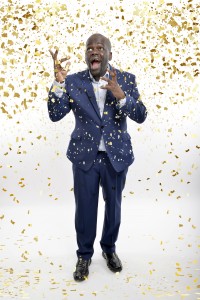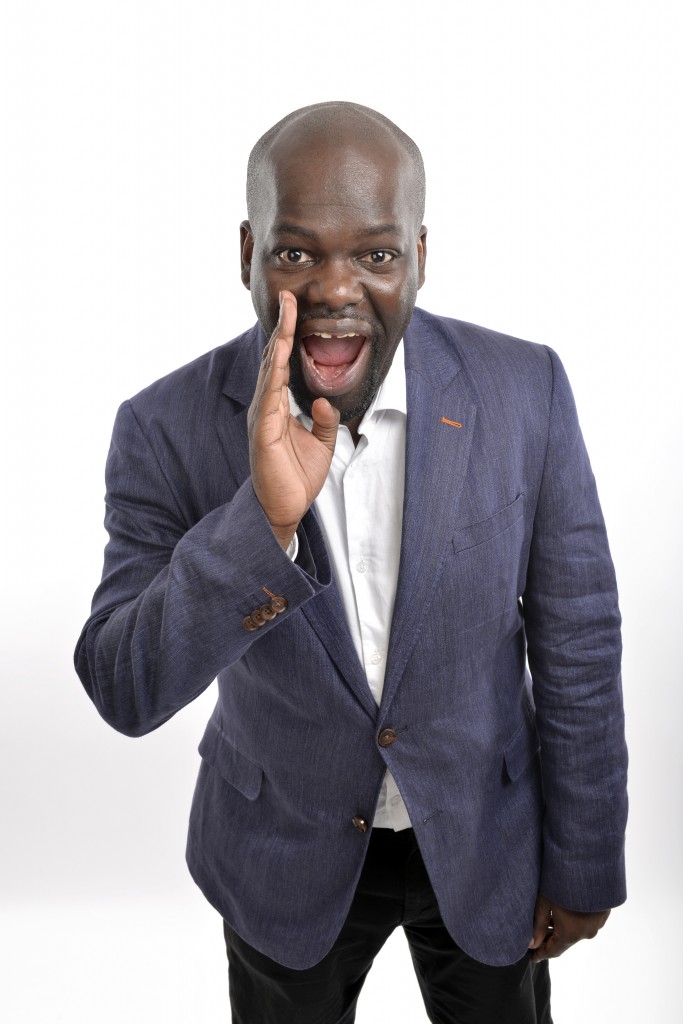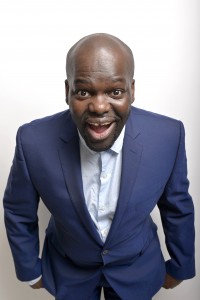“I Cope with the Monsters by Making Fun of Them”: An Interview with Daliso Chaponda

Malawian comic Daliso Chaponda effuses good cheer. Even the timbre of his distinctive speaking voice rings with bonhomie. Few can boast of that.It comes in handy for someone who likes to push his audience’s buttons. Having immersed myself in Chaponda’s world as preparation for our interview, I have a few historical bones to pick regarding his BBC radio show Citizen of Nowhere. I won’t be going easy on him. Chaponda isn’t fazed. ‘All art is a dialogue, not a monologue’, he offers magnanimously. It’s the first of many pithy nuggets.
The title of Chaponda’s weekly broadcast is apt. Born in Zambia, he has lived in Kenya, Swaziland, Thailand, Somalia and Canada. The list is not exhaustive. Contrary to expectation, Daliso is not a super-polyglot.
‘I can say hello and ask for directions in a lot of languages but I’m only fluent in English -maybe French to an extent. I was only in one place for one or two years. I don’t have an ear for languages.’
Daliso became familiar with life as a global citizen very early on.
‘I was going to an expensive school in Kenya which, absurdly, was British. I learned English, French and Latin. There were only three black people in my class. It’s only when I left and look back that I realise how bizarre it was.’
Chaponda’s father went from humble beginnings as a refugee to becoming a senior diplomat. Having embarked on a career as potentially masochistic as stand-up comedy, would Daliso say resilience is in his blood?
‘It caused me to take for granted that you could do absolutely anything no matter how bonkers’ he reflects ‘It’s only when speaking to other people that I realise not every child has that. I didn’t think my race or that I might not be talented in something would ever stop me. I’d grown up in a house where I had parents who were born in villages and one became a doctor, the other a high commissioner of the UN.’
Chaponda is remarkably self-assured, treading the right line between confidence and cockiness. It’s endearing. And useful. Debilitating self-doubt would do him no good as a performer.

‘I’ll be nervous before a date but going on stage, I’m more confident than anything’ he quickly adds ‘It’s the one thing I know I’m good at.’
Still, like the rest of us Daliso is subject to human frailty. He confides ‘It’s balanced by crippling insecurities in other spheres. It’s fine to be confident about your artistry if you’re insecure elsewhere.’
Prior to doing stand-up Daliso had dalliance with computer programming (at the behest of his parents) and journalism. His love affair with comedy began whilst attending Canada’s world famous mirth-fest Just for Laughs. He was eventually to play the festival himself.
‘I thought that would be my big break but then I had to leave the country when my visa was up’ he shares ‘I tried South Africa but that scene was terrible. There were a few comedians -who have all done very well now [including Trevor Noah, with whom Chaponda shared a stage for a month] but they literally built it from the ground up. I was very pessimistic. There was no industry. Little did I know they were going to transform the comedy scene.’
Daliso turned his sights to the UK. By the time he auditioned for Britain’s Got Talent last year, he was a veteran of sorts. I wonder thus what would have been the appeal of a novice’s platform. He objects to this classification.
‘It actually isn’t if you watch the people who do well’. He continues ‘I’d been frustrated because I’d done a lot of auditions. Despite the fact I’d always made the crowd go crazy, I never knew why I didn’t get through. You get all conspiratorial. I liked the idea of a show where if they don’t want me, they will tell me why to my face. I wasn’t getting any love from the mainstream so I thought “I need to cheat; find another way”’.
Daliso avoided the winner’s curse, finishing third. He hasn’t looked back. He’s currently on an extensive UK tour. And of course, there’s Citizen of Nowhere. It’s a diachronic political satire focusing on the relationship between the West and Africa. Listening to the show is a conflicting experience. With sabre-sharp insight, Chaponda dissects the liminal existence of Africans in the diaspora as well as global economic imbalance. On the other hand, the show inadvertently reinforces certain stereotypes about the Continent. It can be grossly over-simplistic (for example, why socialist revolutions stalled across Africa); at times even ahistorical (ignoring the advent of pre-colonial Christianity). Perhaps it’s the nature of the comedy beast. A show of this type nonetheless calls for thoroughness…
Chaponda is mildly exasperated by my pedantry.
‘It’s impossible to cover every subject within 27 minutes’ he explains ‘It’s meant to be a stone you throw into a river and then ripples. If someone has an interest in something you talk about, then they find out more.’
There are also practical considerations.
‘We record 50 minutes and edit down to 27. We choose the bits that get the biggest laughs. It’s a balancing act but I’m not even explaining it away. I am happy with the result. It’s a comedy show first and a lecture second.’
True. But there is a lot of talk on the programme about nuance-or the lack thereof. Wouldn’t it be better not to cover a topic than to do so too lightly?
‘I disagree’ is the swift riposte ‘I think it’s better to speak of it because these are things people are not talking about.’
As well as journalism and comedy, Daliso is also a Sci-Fi writer. I ask about the nexus of his creative outlets. Is it a question of mood?
‘It’s a question of what I’m trying to say’ he replies, ever the pragmatist. ‘The first episode of Citizen of Nowhere came from this personal realisation that as much as I resent a lot of colonialism, I am very much a product of it.’
Admittedly, Daliso addresses this paradox well.
‘On the other hand for example, I wrote a short story about the Rwandan genocide because you cannot make that funny. I don’t necessarily see myself as a comedian or writer first. I try to understand the world through art and what expresses that best.’
Back to pushing buttons. Chaponda has courted controversy to the point of run-ins with censorship boards and being threatened with arrest back in Malawi. Yet his motivations are nobler than mere sensationalism.
‘I generally start with pain. I start with things that depress or enrage me and I try to turn it into something positive. I cope with the monsters by making fun of them.’
It wasn’t always the case. As a fresh-faced young comic back in Canada, Daliso’s thoughts were far from subverting trauma. Then he had a cinematic-related epiphany.
‘When I was a 19, 20 year old most of the jokes were about sex and silliness’ he recalls ‘then I watched Life is Beautiful and I was like “Wow, comedy can do that; be about the most depressing thing and be somewhat uplifting? I need to learn to do that.”’
‘That’s what I’ve been slowly doing. All of these are small steps to the big opus you write when you’re 65 and you’re in command of all the answers.’
How do you stop the line blurring between needless offence and pushing boundaries to provoke thought? (I suggest the This is America video as an (arguably) successful example. Daliso is yet to watch it)
‘I think the dangerous thing as an artist is to focus too much on the effect you will have’ he warns ‘You cannot fully control that.’
Chaponda is open to audience feedback, within limits.
‘I find if people are aware I’m not trying to offend them, they talk to me in a different way to if they were watching a shock-jock. I’ve even changed the language of some jokes because someone has said “Look, I see what you’re trying to do but the way you’re saying it is interfering with that”’
Make no mistake, Daliso is his own man. Nevertheless, there are cultural expectations that constrain artists from a particular background.
‘I think the biggest problem for ethnic artists is that we have to be talking about our ethnicity.’
Case in point, Chaponda envisaged his radio show to vary thematically from week to week. The Beeb were having none of it.
Perhaps this pigeon-holing is part of the global impact of US pop culture. Racialism has drifted across the Atlantic. Once again, Daliso begs to differ on pragmatic grounds.
‘Artists aren’t idiots. Years ago on my first ever TV appearance in Canada I talked about race, love and family for 10 minutes. They edited it down to the three minutes about race. You realise what they want. The next time you go for an audition, you do ten minutes about race and more of if it gets broadcast. The best way to not get your stuff aired is to perform like you’re not living in the real world’.
Although he’s under no illusion, Chaponda believes change is possible; if not exactly imminent.
‘The moment of progress will be when black people can do a show about parrots or juggling. We’re not there now. If you get a big enough audience, then you can do your parrot show. You can’t do it when people don’t know who you are. You have to give them something to latch on to.’
Daliso doesn’t always receive the warm exception where he’d most expect it, even in the UK.
‘Those shows that are American Def Jam style, they want a certain thing which is not me. When it’s an African gig, I do well.’
The experience has left him bemused. He ventures ‘I think it’s because I grew up in countries where there is a black majority. Yes, we had historical crimes committed to us but currently, we are the people we’re seeing in all the television shows. I have noticed I am definitely less triggered by things than some [Western-raised] comedians. I think I’ll never have that same rage’.
One would therefore imagine that Daliso would be most at home in his native Malawi.
‘I’m more of an outsider there than I am in the UK’ he confesses ‘I have different values. A lot of my views are things Malawians would consider offensive. Now it’s good but there were some growing pains in my first shows.’
He illustrates by citing an example where he worked around the notoriously sensitive issue of religion using some biblical ingenuity.
‘By basing it on scripture the audience thought “Oh this guy, he’s read the bible, we’ll listen to him!”. To be an international comedian, you have to know different cultures find different things acceptable.’
The cultural landscape has changed greatly over recent years. After decades of African-American or Caribbean influences shaping the paradigm of perceived ‘blackness’, it seems African artists are increasingly getting recognition across domains. Heck, there’s a worldwide box-office smash set in an (admittedly fictitious) African nation.
Daliso attributes this to ‘… the rise of multi-media. There’s always been stuff from African culture people get excited about. People loved The Lion King; yes it’s an absurd version of Africa but it is Africa. People loved Cry Freedom. When I was young, there was Youssou N’Dour. Wole Soyinka won a Nobel Prize. It’s always been there. The only difference now is that it’s easier to find the art that you like.’
The gamut has nonetheless expanded beyond literature, sport and the odd African musician with worldwide acclaim. chaponda has been charting the maturity of the African comedy scene for decades.
‘I used to cringe at a lot of the comedy that was coming out of Africa 20 years ago. It was very broad and slapstick. Now I tell people “Watch this, please! It’s brilliant”. There’s a thriving South African, Nigerian and Kenyan scene.’
Daliso is optimistic about this trend overall.
‘There’s a lot more innovation in the arts in African countries. It’s rippling across the world. I think it’s a case of better art coming from Africa so it can be exported easier.’
Daliso Chaponda’s “What The African Said” tours the UK throughout Autumn 2018
Twitter: @dalisochaponda
Facebook: https://www.facebook.com/dalisocomedy/
This is an edited version of the original interview.



